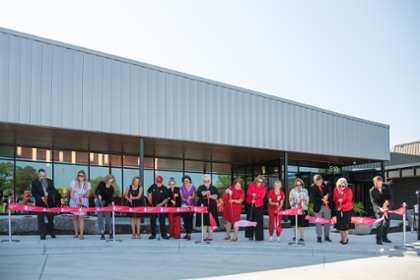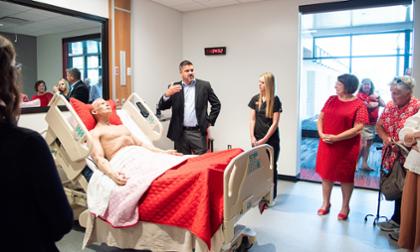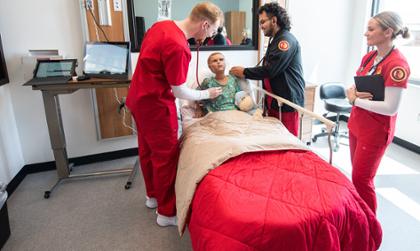They’ll be using the most technologically advanced simulated patients on the market, manufactured by Gaumard.
“We’ve all had tears when we walked in that door and we think about what our students will have to learn in, and our faculty will have to teach in,” said Ashleigh Heter (BSN '09, MSN ‘12, DNP '16), who coordinates the BSN program for juniors and seniors.
It comes at the perfect time: nurses are in high demand. Current data shows a nursing workforce crisis in Kansas and nationally: 275,000 more nurses will be needed nationally by 2030, and in Kansas, it’s projected there will be more than 53,000 nurse openings through 2026 (CNA, RN, and Home Health Aid).
McPherson Hall was built in 1977 to accommodate 60 students; in recent years, the nursing school has had cohorts of 90 students. The new addition will allow for cohorts of 120.

The simulation hospital was built by McCownGordon and funded by private gifts initiated by donors after they learned of the need.
The project includes a 10,000-square foot addition to McPherson Hall, and renovations of approximately 14,000 existing square feet.
The building includes simulated hospital rooms, associated control and preparation rooms, debriefing rooms, a waiting area, and a nurse’s station.
The classrooms are flexible spaces outfitted with large monitors so students can see presentations no matter where they’re seated.
Carpeting throughout, and into McPherson Hall, lessens noise.
Large glass windows allow for natural light. Ultimately, though, it’s not about the building — it’s what they will learn.
Vice President for University Advancement Kathleen Flannery, also the president of the PSU Foundation, noted that as with all buildings on campus, “it is the learning that happens within these walls that is transformative.”

Cheryl Giefer (BSN ‘78, FNP ‘96), director of the nursing school, said studies show hi-fidelity patient simulators in realistic situations equip nursing students with skills equal to a clinical setting; they also are able to repeat skills as many times as necessary to master them.
“This simulation hospital and its state-of-the-art environment is essential in developing competent, registered nurses,” Giefer said. “They’ll face these situations in their first year of nursing, and now they’ll be ready.”
Faculty are able to evaluate every student on an equal basis — it isn't dependent on what patients they see on a given day in a clinical setting.
Heter said the purpose of the addition is to give graduates a realistic setting in which to practice skills — and make mistakes — before they begin their careers.
“When they actually do get out into a hospital, they’ll have had experiences that they can draw from,” Heter said.

Hi-fidelity simulated patients include a pediatric mannequin that can cough, move, and present symptoms; an adult patient that can have conversations; and a birthing simulator complete with mixed reality goggles to see what’s happening inside the patient — including uterine contractions.
“We’re in a rural community, so some of our graduates will go on to work in small medical centers where there may not be a doctor, and they need to be somewhat knowledgeable about precipitous delivery,” Heter said.
Because simulated patients are used, students are able to make mistakes that won’t harm a patient and can learn from those mistakes.
“I’m looking forward to using this new space,” said Senior Alyssa O’Hare, of Kansas City. “It will be a great home — we can study here, practice here, do simulations here.”
Senior Zackary Goswick, of Webb City, Missouri, said the simulation hospital will give students "as close to the real environment as we can get."
Senior Olivia Chase, of Louisburg, Kansas, said she believes it will take their skills to the next level.
“It’s going to help us feel a lot more confident by the time we graduate,” she said. “It gets me really excited for senior year, and for all those who come after us.”
“This is about making lives better through education,” President Dan Shipp. “It’s pretty simple, but so important to our communities. That’s what this is all about. The quality of education – those skills and tools that all of you will leave here with to go out and make life better in our communities.”
Special guests at the ceremony included members of the Kansas Board of Regents, the Pittsburg Area Chamber of Commerce, the Foundation trustees, and donors.
Today’s students can select programs such as the BSN (Pre-licensure), RN to BSN, MSN (Education Emphasis), MSN to DNP, and the BSN to DNP.
The baccalaureate degree program in Nursing, master’s degree program in Nursing, and Doctor of Nursing Practice are accredited by the Commission on Collegiate Nursing Education.
The bachelor's of science in Nursing and Doctor of Nursing Practice programs are approved by the Kansas State Board of Nursing.